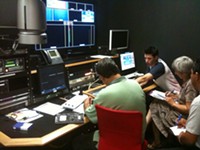Meet the New Boss
Austin Film Society rolls out their public access plan
By Richard Whittaker, Fri., Sept. 4, 2015
It's a new day for Austin's public access cable stations, as the Austin Film Society takes over management at the beginning of October. AFS Deputy Director Sarah Ann Mockbee explained, "Access is in the name. That's the whole point. We want to take this community resource and maximize it."
On Oct. 1, AFS takes over management of the city's 7,000-square-foot public access studios in East Austin, and the three channels produced there. However, before Council instructed staff to finalize the contract (see "Austin Film Society Wins Public Access Bid," News, Aug. 21), they were not allowed to talk about their plan with anyone – not press, not Council, not station staff or volunteers. That left an information vacuum, which the society is filling with one simple message: Don't worry, the place won't transform overnight.
In the short term, that means very little change. So far, only the manager vacancy has been posted, with more to come. However, for the foreseeable future, all existing producer licenses will remain valid, and the society wants those volunteers to work with them to define what the channels should look like, what initiatives they are interested in, and how the station should invest money earmarked in the city's 2012 bond. AFS board president Mike Blizzard said, "Then we'll have a true launch, several months after October 1."
The AFS era begins after they beat out current managers channelAustin in a regularly scheduled bidding process. Blizzard said both he and AFS Executive Director Rebecca Campbell had been contacted by community members eager for them to apply. Rather than stretching into new territory, both saw it as a natural fit for AFS's remit. He said, "It's already a multi-modal organization. It has education programs, it has grants for emerging filmmakers, it runs a film studio, and it programs five screenings a week."
There's still a learning curve, and while there are hundreds of public access channels around the country, very few contract management out to a larger organization. For guidance, staff and board members visited one of that small number: San Francisco's SF Commons, run by the Bay Area Video Coalition. Blizzard said, "We interviewed all the employees, to talk about their structures, what worked and what didn't, and what they would do differently."
Aside from expanding its portfolio, adding the public access facility will help AFS in its plans to extend its public education component. That's always been tricky, since their current offices at Austin Studios on East 51st Street mean they're bringing students and interns onto a closed set. The addition of the National Guard Armory improved that access, but the city-owned studios on Rosewood Avenue are purpose-built for the public. Blizzard said, "This will be a place that's more focused on the community, and be extremely accessible – not just to individuals looking to produce shows, but to nonprofits to share their stories."
There are also formal opportunities to be considered. Aside from collaborative projects with Austin ISD and Austin Community College, AFS takes in around 100 interns a year that could benefit from immediate access to this professional studio setting. The facility could also become an important career development tool for budding professionals. Mockbee noted that many of Austin's filmmakers supplement their income with commercial work, and that the facility and programming could help "people who are trying to learn to use the equipment because they're trying to get a job and it's required of them."
In the long term, they hope the AFS brand could leverage a higher profile for Austin's growing film and television community. Blizzard said, "We want to increase the quality and the importance of the content being made at that facility, and get it out there every way possible, not just on the dedicated cable stations."













